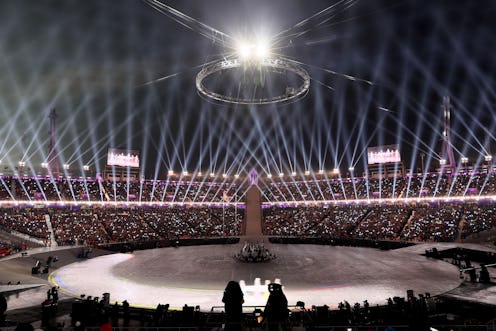
The 2018 Winter Olympics are soon coming to an end, almost as quickly as they arrived. But don't worry, they'll definitely go out with a bang. Just like when they began with a K-pop filled opening ceremony, the 2018 PyeongChang Games will conclude with what is expected to be a stellar Olympic closing ceremony. What countries are or aren't at the ceremony isn't announced in advance of the festivities, but you can expect a pretty full house.
While most participating countries are likely to attend, one in particular is still up in the air: Russia. If you didn't already know, Russia was officially banned from the 2018 Winter Olympics over a massive doping scandal. While Russia was formally disinvited from competing, select athletes who were not implicated in the doping controversy were allowed to compete.
Those athletes were not allowed to compete as Russia, or use the Russian flag and anthem during the games, however. Instead, the athletes marched under the Olympic flag during the opening ceremony and the Olympic Anthem was played any time one of them won a gold medal (traditionally, the anthem of the country who wins gold plays during medal ceremonies.) The Russian athletes were referred to as OAR, or Olympic Athletes of Russia, throughout the games.
And there's another twist: the International Olympic Committee (IOC) said that Russia may be permitted to participate in the closing ceremony under its own flag. In order for that to happen, though, OAR athletes must comply with a list of specific rules. Whether or not they will be allowed to march under the Russian flag is scheduled to be announced on Saturday, just one day ahead of the closing ceremony.
Like the opening ceremony, the goings-on at the closing ceremony are largely kept secret until it actually happens. That being said, it's reasonable to expect an emphasis on South Korean culture and history.
According to Oh Jang-hwan, the director of ceremonies for the PyeongChang 2018 Organizing Committee, the closing ceremony's theme will be "Next Wave." This is fitting for several reasons: it will get people excited about the next Olympics. The Olympic torch also will be handed off to representatives of the 2020 host country at the closing ceremony. In this case, that would be Japan, because the 2020 Summer Games are scheduled to take place in Tokyo.
If you need a refresher, this year's opening ceremony, focused on the theme of "Harmony and Convergence." It featured hundreds upon hundreds of drummers, virtual reality-augmented spectacles, massive silk puppets, and one questionable smiley face. If that ceremony was any indication, the closing ceremony should not disappoint.
When it comes to the opening and closing ceremonies at the Olympics, host countries tend to leap on the opportunity to show off pieces of their culture. This generally includes some retelling of major historical events, local music, clothing, and dancing. In the modern era, it also means lots and lots of flashing lights.
Host countries pull out all the stops for various reasons. Competition, of course, is one because a country wouldn't want to deliver a boring ceremony after the previous host country's particularly spectacular one. On top of that, no country can reasonably bank on when, and if, they will ever have the opportunity to host the Olympics again. So there's definitely a "now or never" component to all of the pomp and circumstance at these ceremonies. It's the host country's chance to tell the world, "Hey! This is us!"
As so far as the countries participating in the closing ceremony, athletes' spirits likely will be high regardless of how well the athletes performed. After all, making it to the Olympics is a spectacular feat in and of itself, and it's something worth celebrating.